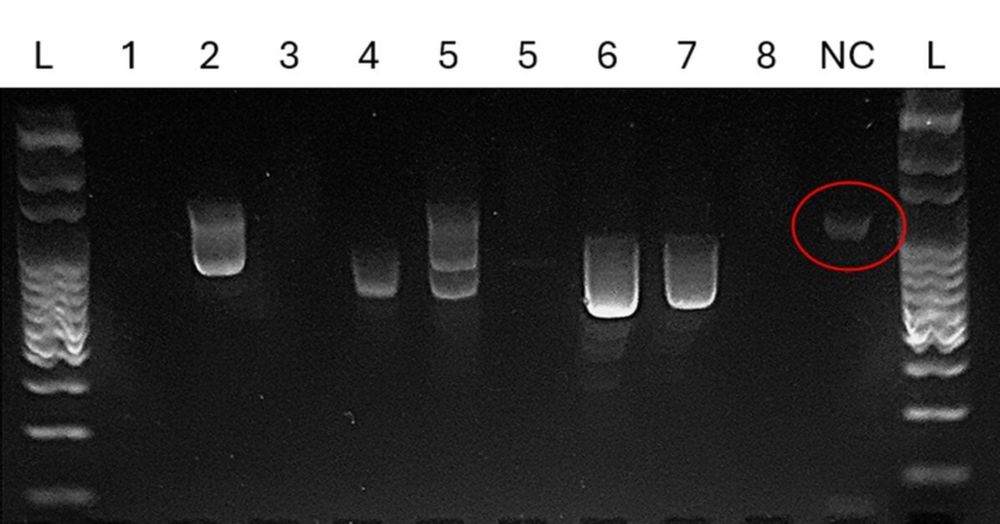Bento Lab 🧬
@bento.bio
690 followers
400 following
170 posts
We make Bento Lab = a portable PCR workstation.
Content about DNA methods, field work and more.
https://bento.bio
Posts
Media
Videos
Starter Packs
Bento Lab 🧬
@bento.bio
· 2d
Bento Lab 🧬
@bento.bio
· 5d

Introducing NOMAD: A Field-Deployable Workflow for Rapid, On-Site Microbiome Analysis of Raw Bovine Milk Using Full-Length 16S rRNA Sequencing
Raw bovine milk hosts a diverse microbiota that profoundly influences dairy product quality, safety, and shelf-life. However, current surveillance methods are time-intensive and often lack the taxonom...
doi.org
Bento Lab 🧬
@bento.bio
· 8d

BioSTEM: A modern educational tool for research and innovation in the field of molecular biology and personalized medicine - Human Genomics
Personalized Medicine has the potential to transform modern healthcare by tailoring medical decisions to an individual’s unique genomic profile. However, its integration into routine clinical practice is hindered by limited genomics education among healthcare professionals and a general lack of public awareness. To address these challenges, we introduce the BioSTEM initiative, an innovative educational tool designed for primary, elementary, and high school students. BioSTEM combines optimized online learning modules with interactive audiovisual content, fostering direct communication between students and educators. It also integrates alternative learning strategies, such as online games and comics, to enhance engagement with topics in Biology, Molecular Biology, Genetics, and Personalized Medicine. Since 2016, BioSTEM has reached over 6,000 students across three countries through a combination of theoretical instruction and hands-on experiments using a portable molecular biology laboratory. Our results indicate that participation in BioSTEM significantly improved students’ and educators’ perception of their understanding of concepts in Genetics and Personalized Medicine. Participants reported a stronger grasp of genomic concepts and expressed support for incorporating BioSTEM into the standard biology curriculum. These findings suggest that BioSTEM is a promising and scalable approach to advancing biomedical education and fostering the development of genomic-literate citizens.
doi.org
Bento Lab 🧬
@bento.bio
· 13d

Rapid and sensitive on-site detection of SARS-CoV-2 RNA from environmental surfaces using portable laboratory devices | Microbiology Spectrum
This study presents the development of a highly sensitive on-site method for detecting severe acute respiratory syndrome coronavirus 2 (SARS-CoV-2) RNA on various surfaces, including doorknobs and tables. Identifying SARS-CoV-2 RNA on these surfaces can ...
journals.asm.org
Bento Lab 🧬
@bento.bio
· 14d

Nanopore sequencing technology for clinical diagnosis of infectious diseases where laboratory capacity is meager: A case report
In resource-limited settings, patients are often first presented to clinical settings
when seriously ill and access to proper clinical microbial diagnostics is often very
limited or non-existing. On F...
www.cell.com
Bento Lab 🧬
@bento.bio
· 15d

Development of loop-mediated isothermal amplification (LAMP) assays for the detection of diarrheagenic E. coli in wastewater | Applied and Environmental Microbiology
Foodborne diarrheagenic E. coli poses a public health threat, while the variability in transmissible agents hampers
outbreak investigation. The lack of lab equipment, such as thermocyclers, in some
la...
journals.asm.org
Bento Lab 🧬
@bento.bio
· 16d

F1000Research Article: Re-sequencing of the complete chloroplast genome of <i>Cinnamomum burmanni </i>(Nees & T.Nees) Blume (Lauraceae) from Indonesia using MinION Oxford Nanopore Technologies.
Read the latest article version by Richard Andreas Salindeho, Fifi Gus Dwiyanti, Rahadian Pratama, Deden Derajat Matra, Muhammad Majiidu, Iskandar Z. Siregar, at F1000Research.
f1000research.com
Bento Lab 🧬
@bento.bio
· 26d

Rapid on-site universal vertebrate species identification via multi-barcode nanopore sequencing
The growing illegal wildlife trade (IWT) threatens biodiversity and is a conduit for zoonotic disease, yet its risk of detection is low. Once processed, trafficked species are difficult to identify mo...
doi.org
Bento Lab 🧬
@bento.bio
· 27d
Investigating the Demography and Parasites of Spring-Migrating Cedar Waxwings (<i>Bombycilla cedrorum</i>) in Virginia After a Single-Day Mortality Event
While investigating the cause of death in a cedar waxwing (Bombycilla cedrorum) mortality event in March 2024 in Roanoke, Virginia, we collected parasites, investigated gizzard contents, and described...
digitalcommons.odu.edu
Bento Lab 🧬
@bento.bio
· Sep 5

Using a mobile nanopore sequencing lab for end-to-end genomic surveillance of Plasmodium falciparum: A feasibility study
Genomic epidemiology holds promise for malaria control and elimination efforts, for example by informing on Plasmodium falciparum genetic diversity and prevalence of mutations conferring anti-malarial drug resistance. Limited sequencing infrastructure in many malaria-endemic areas prevents the rapid generation of genomic data. To address these issues, we developed and validated assays for P. falciparum nanopore sequencing in endemic sites using a mobile laboratory, targeting key antimalarial drug resistance markers and microhaplotypes. Using two multiplexed PCR reactions, we amplified six highly polymorphic microhaplotypes and ten drug resistance markers. We developed a bioinformatics workflow that allows genotyping of polyclonal malaria infections, including minority clones. We validated the panels on mock dried blood spot (DBS) and rapid diagnostic test (RDT) samples and archived DBS, demonstrating even, high read coverage across amplicons (range: 580x to 3,212x median coverage), high haplotype calling accuracy, and the ability to explore within-sample diversity of polyclonal infections. We field-tested the feasibility of rapid genotyping in Zanzibar in close collaboration with the local malaria elimination program using DBS and routinely collected RDTs as sample inputs. Our assay identified haplotypes known to confer resistance to known antimalarials in the dhfr, dhps and mdr1 genes, but no evidence of artemisinin partial resistance. Most infections (60%) were polyclonal, with high microhaplotype diversity (median HE = 0.94). In conclusion, our assays generated actionable data within a few days, and we identified current challenges for implementing nanopore sequencing in endemic countries to accelerate malaria control and elimination.
doi.org















